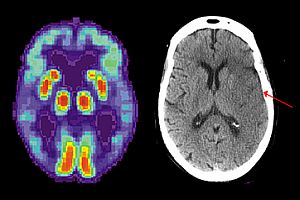Early Tests for Predicting Dementia and Stroke
 Do you often find that people can’t keep up with your normal walking pace? Do you frequently notice that others have a much weaker handshake than you do? If you answered “yes” to these questions, you may be less likely to suffer from a stroke or dementia in your older age.
Do you often find that people can’t keep up with your normal walking pace? Do you frequently notice that others have a much weaker handshake than you do? If you answered “yes” to these questions, you may be less likely to suffer from a stroke or dementia in your older age.
A recent study presented at the American Academy of Neurology’s 64th annual meeting found that those who were speedier walkers had a 42 percent reduced risk of stroke or transient ischemic attack (TIA) after age 65. Those with greater hand grip strength demonstrated a reduced risk of dementia.
The researchers knew that frailty and reduced physical agility was associated with an increased risk of dementia in elderly people, but wondered if these factors measured in middle age might be a predictor of this outcome.
Investigators studied over 2,400 men and women with a mean age of 62 years over a period of up to 11 years. Subjects were tested at the beginning of the study to assess their walking speed, hand grip strength and cognitive ability, and a brain MRI was performed on each subject. Over the 11 years of the study, 70 people had a stroke and 34 people developed dementia.
Those with a slower walking speed were 1.5 times more likely to develop dementia than their speedier counterparts, showed lower total brain volume, and scored worse on tests of memory, learning, decision making, language ability and visual perception.
Those with a stronger hand grip not only had a reduced risk of stroke, they also demonstrated higher brain volume and better scores on all the above-mentioned tests when compared with those with a weaker hand grip.
Erica C. Camargo, MD, MSc, PhD, from Boston Medical Center and co-author of the study said of the walking and hand grip tests, “These are basic office tests which can provide insight into risk of dementia and stroke and can be easily performed by a neurologist or general practitioner.” If these simple tests are performed on people during middle age, their results may be able to determine if a more detailed assessment of brain function is warranted in order to help prevent further degeneration. Camargo added, “Further research is needed to understand why this is happening and whether preclinical disease could cause slow walking and decreased strength.”
Dr. Marshall Keilson, director of neurology at Maimonides Medical Center in New York, said of the study, “At the very least, this research suggests novel approaches to early identification of dementia and stroke risk. It would be interesting to test an even younger patient population with the same protocol.”